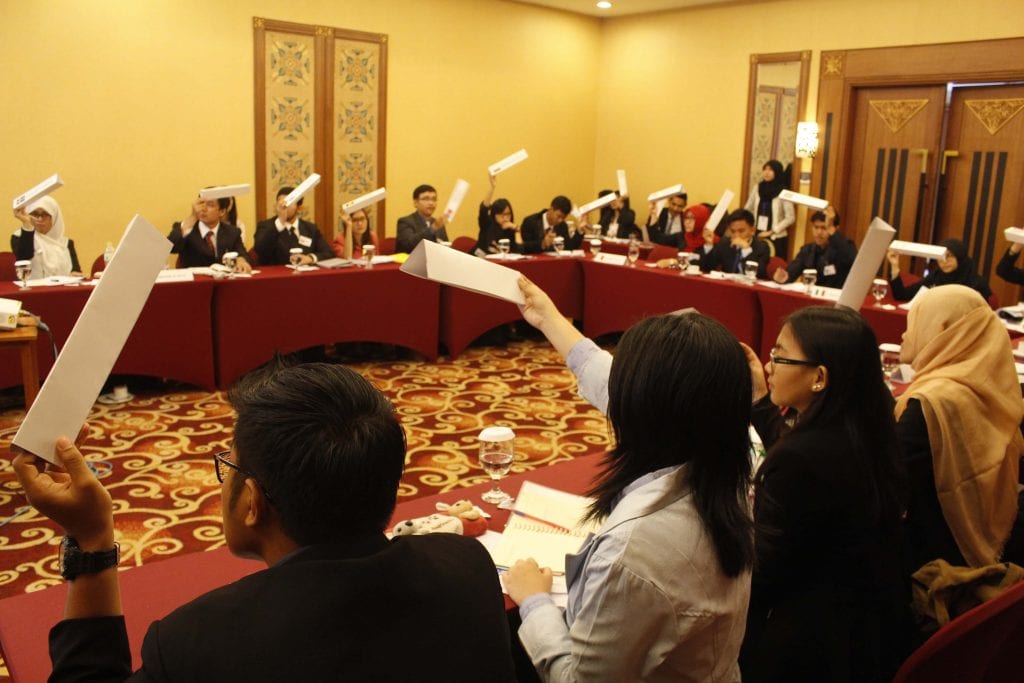We are proud to present the very first Model European Union (which is commonly known as MEU) in Indonesia since took place in 2007. MEU is an international simulation of the European Union’s political system in purpose of education. Participants of the conference are divided into three positions such as Members of Parliament, Members of the Council, and Lobbyists. Participants debate two controversial, real-life legislative proposals drafted by the European Commission and simulate European Union law making by acting as Members of Parliaments or Ministers of the Council. MEU is aimed to improve the skill of participants in debating and negotiating at a complex scale of the European Union decision making process in practice. It goes without saying that MEU amounts to a unique learning process that focuses on the workings and dynamics of European Union institutions when producing law.
There were 72 participants who registered in the MEU, which 28 of them were allocated to the European Council and 44 persons were in the European Parliament. The participants came from various academic background and different cities. Some of them were still fresh graduates from senior high school, some were undergraduate students and one master student. This MEU became the first experience for almost half of the participants in joining a simulation forum in any type, while several participants had had prior experience in Model United Nations. Therefore, the first half of the first day of the MEU was less dynamic because the participants tend to be shy and still observing the situation. But then in the rest of the day, they had finally started to be more active in raising motions or exchanging memos.
The main topic of the discussion is about the CPO (Crude Palm Oil). The palm oil is surely a unique type of commodity, and the main reason why it is called so is because of its wide range of usage. From base ingredient of edible goods like chocolate and processed dairy products, palm oil is also the main ingredients of day-to-day product like shampoo, body lotion and deodorants. The European Union is the home of advanced corporations that produce world’s most-known brands of chocolates, deodorant and other products which are based on palm oil. These corporations are accounted for over than 500 million consumers spread in Europe and other countries in all over the world. Such big consumption is responsible for approximately €5.4 billion worth of palm oil import in 2012 alone. As much as 85% of this massive consumption of palm oil comes from world’s greatest palm oil producing countries, Malaysia and Indonesia.
Other than to ambitiously envision 100% RSPO certification for European products, EU also envisions promoting renewable energy to replace non-renewable energy. The goal is to ensure that all EU countries have at least 10% of their transport fuels to come from renewable energy by 2020. This ambitious goal emerged under the framework of EU’s Renewable Energy Directive, which is also supported by accommodative environmental policy, such as the widely known EU Biofuel Policy. This is enacted as an effort of the EU to preserve remaining non-renewable fuel while trying to suppress the CO2 emission coming from fossil fuels. Biofuel is a renewable energy source that is extracted commonly from edible crops like corn and maize, but most prominently crude palm. Under the biofuel supports policy, which came into action in 2003, is aiming to promote the usage of biofuel to replace conventional fossil fuel.
However, the policy becomes highly criticized by many environmentalists after the damaging effect of this policy begins to appear in developing countries, where most of the crops used to produce biofuel are planted. The initial effort to suppress environmental damage caused by the usage of fossil fuel in transportation sector becomes counterfactual, as turns out, the flaws within EU’s biofuel policy lets unsustainable palm oil industries to be preserved in a way that is very much different than what is mentioned in RSPO. In this conference, the delegates were expected to exercise their utmost creativity to generate cutting-edge and most practical solutions to make bridge the interests of business and pursuit to sustainable development. By having this experience of playing role as European Parliament or European Council, the delegates finally at least have two important lessons learnt; first, they know how the European institutions work in policy making process and second, enrich their own knowledge about one of the most tangible issues faced by European Union.
On the last day, in the evening, the DCTM was closed by Table Manner course, which hosted by Jogjakarta Plaza Hotel. The participants were also the same participants of the three-day event, plus several additional participants who particularly registered for Table Manner course only. Table Manner is considered to be another form of diplomatic course that are usually executed in the form of ethics of a formal supper. Table manner has always been practiced in the real case scenario as a part of diplomatic course. In regards to that, during this chain of events, Table Manner is perceived as a complimentary of all aspect of diplomatic course that are preceded with Seminar and Model European Union.
Edited by: Maylany Ika Putri





